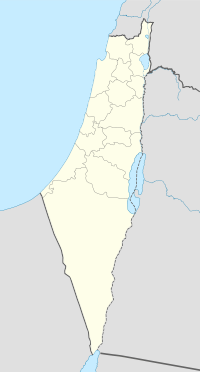Ayn al-Mansi
Ayn al-Mansi
عين المنسي 'Ein al-Mansi | |
|---|---|
| Etymology: el Mensi= "the forgotten"[1] | |
A series of historical maps of the area around Ayn al-Mansi (click the buttons) | |
Location within Mandatory Palestine | |
| Coordinates: 32°35′36″N 35°10′38″E / 32.59333°N 35.17722°E | |
| Palestine grid | 166/222 |
| Geopolitical entity | Mandatory Palestine |
| Subdistrict | Jenin |
| Date of depopulation | mid-April 1948[2] |
| Area | |
• Total | 1,295 dunams (1.295 km2 or 320 acres) |
| Population | |
• Total | 90 |
| Cause(s) of depopulation | Military assault by Yishuv forces |
Ayn al-Mansi (Arabic: عين المنسي, Ein el Mansî) was a Palestinian Arab village in the District of Jenin of the Mandatory Palestine. It was depopulated as a result of a military attack in mid-April during the 1947–48 Civil War in Mandatory Palestine.[2]
History
[edit]During the 19th and first half of the 20th century, Ayn al-Mansi was one of the settlements of the so-called "Fahmawi Commonwealth" established by Hebronite clans belonging to Umm al-Fahm. The Commonwealth consisted of a network of interspersed communities connected by ties of kinship, and socially, economically and politically affiliated with Umm al Fahm. The Commonwealth dominated vast sections of Bilad al-Ruha/Ramot Menashe, Wadi 'Ara and Marj Ibn 'Amir/Jezreel Valley during that time.[5]
In the 1882 the PEF's Survey of Western Palestine (SWP) described El Mensi as: "A small ruined village, with springs."[6]
British Mandate era
[edit]In the 1931 census of Palestine, conducted by the British Mandate authorities, Ein el Mansi had 73 Muslim inhabitants, in a total of 15 houses.[7]
In addition to agriculture, residents practiced animal husbandry which formed was an important source of income for the town. In 1943, they owned 13 heads of cattle, 2 horses, 10 donkeys, 270 fowls, and 10 pigeons.[8]
In the 1945 Village Statistics, Ayn al-Mansi's population was estimated at 90 Muslims,[3] and the jurisdiction of the village was 1,295 dunams of land.[4] Of this, 186 dunams were used for plantations and irrigable land, 868 dunams were used for cereals,[9] while 2 dunams were built-up (urban) land.[10]
1948 and aftermath
[edit]Ayn al-Mansi became depopulated after Military assault in mid-April 1948.[2]
References
[edit]- ^ Palmer, 1881, p. 151
- ^ a b c Morris, 2004, p. xviii, village #386. Also gives cause of depopulation.
- ^ a b Government of Palestine, Department of Statistics, 1945, p. 16 Archived 2018-09-05 at the Wayback Machine
- ^ a b Government of Palestine, Department of Statistics. Village Statistics, April, 1945. Quoted in Hadawi, 1970, p. 54 Also gives total land area in dunums.
- ^ Marom, Roy; Tepper, Yotam; Adams, Matthew J. (2024-01-03). "Al-Lajjun: a Social and geographic account of a Palestinian Village during the British Mandate Period". British Journal of Middle Eastern Studies: 8–11. doi:10.1080/13530194.2023.2279340. ISSN 1353-0194.
- ^ Conder and Kitchener, 1882, SWP II, p. 67
- ^ Mills, 1932, p. 68
- ^ Marom, Roy; Tepper, Yotam; Adams, Matthew J. (2024-01-03). "Al-Lajjun: a Social and geographic account of a Palestinian Village during the British Mandate Period". British Journal of Middle Eastern Studies: 20. doi:10.1080/13530194.2023.2279340. ISSN 1353-0194.
- ^ Government of Palestine, Department of Statistics. Village Statistics, April, 1945. Quoted in Hadawi, 1970, p. 98
- ^ Government of Palestine, Department of Statistics. Village Statistics, April, 1945. Quoted in Hadawi, 1970, p. 148
Bibliography
[edit]- Conder, C.R.; Kitchener, H.H. (1882). The Survey of Western Palestine: Memoirs of the Topography, Orography, Hydrography, and Archaeology. Vol. 2. London: Committee of the Palestine Exploration Fund.
- Government of Palestine, Department of Statistics (1945). Village Statistics, April, 1945.
- Hadawi, S. (1970). Village Statistics of 1945: A Classification of Land and Area ownership in Palestine. Palestine Liberation Organization Research Center.
- Khalidi, W. (1992). All That Remains: The Palestinian Villages Occupied and Depopulated by Israel in 1948. Washington D.C.: Institute for Palestine Studies. ISBN 0-88728-224-5.
- Mills, E., ed. (1932). Census of Palestine 1931. Population of Villages, Towns and Administrative Areas. Jerusalem: Government of Palestine.
- Morris, B. (2004). The Birth of the Palestinian Refugee Problem Revisited. Cambridge University Press. ISBN 978-0-521-00967-6.
- Palmer, E.H. (1881). The Survey of Western Palestine: Arabic and English Name Lists Collected During the Survey by Lieutenants Conder and Kitchener, R. E. Transliterated and Explained by E.H. Palmer. Committee of the Palestine Exploration Fund.
External links
[edit]- Welcome To 'Ayn al-Mansi
- 'Ayn al-Mansi, Zochrot
- Survey of Western Palestine, Map 8: Wikimedia commons
- 3ein Al-Mansi, Dr. Moslih Kanaaneh
- Booklet about Ayn al-Mansi (2006), downloadable, from Zochrot






